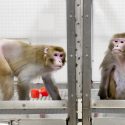$6.75 million to extend primate studies of diet and aging
A decade-long study of how diet affects the process of growing old, will continue and be expanded at the UW–Madison with the help of $6.75 million from the National Institutes of Health (NIH).
|
See also: The biomarkers of aging (information graphic) |
Begun in 1989 at the Wisconsin Regional Primate Research Center (WRPRC) , the study of rhesus macaques on controlled diets is one of only two such studies in the world. The research, according to Richard Weindruch, a UW–Madison Medical School professor and the lead scientist for the project, is intended to answ er a central question of biology: Can aging be held at bay by cutting down on calories?
“Dietary restriction offers a powerful experimental strategy to explore mechanisms of aging because it is the on ly intervention which has repeatedly and strongly increased maximum life span and retarded the rate of aging in laborato ry rodents,” said Weindruch. “But the study of calorie restriction and aging in non-human primates is in its infancy, as compared to the body of work done in rodents.”
The new grant will enable scientists to continue studies in rhesus macaques, a much-studied and long-lived anima l whose genetic and physiological characteristics parallel those of humans. The work is being conducted in several group s of primates whose calorie intake for the past five to 10 years has been reduced by about 30 percent, as well as monkey s whose diets permit them to eat as much as they wish.
The study of rhesus monkeys builds on extensive research in rodents, spiders and other animals that shows life span can be significantly extended and the rate of aging slowed by maintaining a nutritious but restricted diet, according to Weindruch.
In the ongoing Wisconsin study, the influence of diet on aging is tracked by monitoring and measuring a set of biological functions, known as biomarkers of aging, that tend to change as animals and people grow older (see sidebar).
Over the past decade, the Wisconsin study has provided a wealth of new information about the biology of aging and how the manipulation of diet can influence the process of growing old. Those finding include:
- Signs that good health can be extended into old age. Diabetes, for example, has been held at bay in monkeys on a restricted diet. Animals allowed to eat freely have a greater incidence of diabetic or pre-diabetic conditions.
- Monkeys on a reduced-calorie diet have fewer signs of spinal arthritis, a condition that manifests itself wi th age in rhesus monkeys and humans alike.
- Physical activity in calorie-restricted animals and monkeys not on a diet is about the same.
- Signs that fewer calories may reduce the risk of vascular disease.
The next five years of the study, Weindruch said, should be even more insightful as the monkeys in the study ent er late middle age: “During this phase, age-related diseases and disorders appear more frequently, including adult-onset diabetes, osteoporosis, cancers, the loss of skeletal muscle mass and hypertension.”
Because the monkeys – which, in captivity, can live to be 40 years old — are only now entering late middle age, a definitive answer to the big question of the link between diet and aging will not come for another 10 to 20 years.
But a direct application of the research to human health, Weindruch said, could come in the form of clinical tri als in people. Although difficult to conduct because of the need for strict control and measurement of diet, some people may be highly motivated to restrict their calorie intake because their genes may predispose them to diseases which are prevented by calorie restriction in laboratory mice.
These include many types of cancers and lupus.
Another potential but long-term application may come through the development of drugs that slow aging by mimicki ng the biological effects of caloric restriction.

